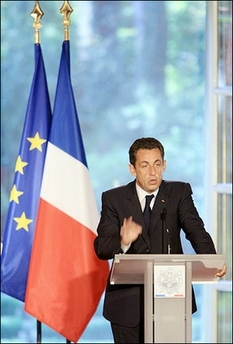Sarkozy calls for troop exit from Iraq
Updated: 2007-08-28 10:42
PARIS -- French President Nicolas Sarkozy on Monday said Iraq's road to recovery begins with a clear timetable for the pullout of foreign troops as he outlined an assertive role for France in world hotspots.
 French President Nicolas Sarkozy delivers a speech during a conference of 180 ambassadors at the Elysee Palace in Paris August 27,2007. [AFP] |
Making his first major foreign policy speech since taking office earlier this year, Sarkozy recalled that France had opposed the US invasion of Iraq in 2003 but that it was now ready to help the international community find a political solution.
"A clear horizon must be defined concerning the withdrawal of foreign troops," Sarkozy said in the address to French ambassadors from 180 countries.
"It is the expected decision on this issue that will force the players to weigh their responsibility and organise themselves accordingly," he said.
Sarkozy stressed that "Iraqi extremists must be marginalized," a "true process of national reconciliation" launched and a timetable for the military withdrawal spelled out in Iraq before France and other governments can play a useful role.
The address came after Foreign Minister Bernard Kouchner was forced to make an apology for suggesting that Iraqi Prime Minister Nuri al-Maliki stand down for failing to quell the ongoing violence.
Kouchner took French foreign policy in a new direction last week when he paid a visit to Baghdad, offering to help stabilise the country and mediate between the warring communities.
But after apologizing on French radio for his remarks, the foreign minister appeared to backpedal when he told the conference of ambassadors that Maliki "may be leaving us soon."
Describing Iran's nuclear programme as "undoubtedly the most serious crisis before us today," Sarkozy said UN Security Council member France was determined to prevent Tehran from developing a nuclear bomb and described a nuclear-armed Iran as "unacceptable."
The threat of sanctions coupled with an offer of dialogue was the only way of avoiding a "catastrophic alternative: an Iranian bomb or the bombing of Iran," he said.
The statement stood in contrast with his predecessor Jacques Chirac who in February said in an interview that a nuclear-armed Iran may be inevitable, sparking consternation in Western capitals which had maintained a tough line with Tehran.
Sarkozy held out the prospect of rewarding Tehran if it backs down.
"France will spare no effort to convince Iran that it has much to gain by engaging in serious negotiations with the Europeans, the Americans, the Chinese and the Russians," he said.
The president also held out the prospect of improved relations with Syria if Damascus agrees to help break the current political crisis in Lebanon, France's close ally in the Middle East.
On the conflict between Israel and the Palestinians, Sarkozy served notice that France would not allow a "Hamastan" to emerge in the Palestinian territories after the takeover of the Gaza Strip by the radical Hamas group in June.
"We cannot resign ourselves to this outcome," said Sarkozy.
Avoiding a clash between Islam and the West is the "first challenge" facing French diplomacy in the 21st century and security agencies in Western governments must work in "total cooperation" to combat terrorism, he said.
Widely seen as more pro-US than Chirac, Sarkozy underscored the importance of the Franco-US friendship but added that France was free to disagree with the United States. "To be allied does not mean to be aligned," he said.
His address drew criticism from opposition Socialist Jean-Luc Melenchon who accused Sarkozy of "aligning France with the world view upheld by President (George W.) Bush and American neo-conservatives."
The French leader also made the case for a "strong Europe", saying France would in the coming months take "very strong" initiatives to build European defence and renew the NATO military alliance.
He appeared to soften his stance on Turkey, saying France would not block negotiations between the European Union and Ankara over Turkish membership as long as the 27-nation bloc engaged in a "vital reflection" on its borders.
Sarkozy also took a swipe at President Vladimir Putin, saying Russia was staging a comeback on the world scene by using its oil and gas wealth with "brutality."
"When you're a great power, you must ignore brutality," said Sarkozy.
The 52-year-old French leader said he supported calls to expand the Group of Eight (G8) club of wealthy countries to a G13 to bring in Brazil, China, India, Mexico and South Africa.
|
|
|
||
|
||
|
|
|
|